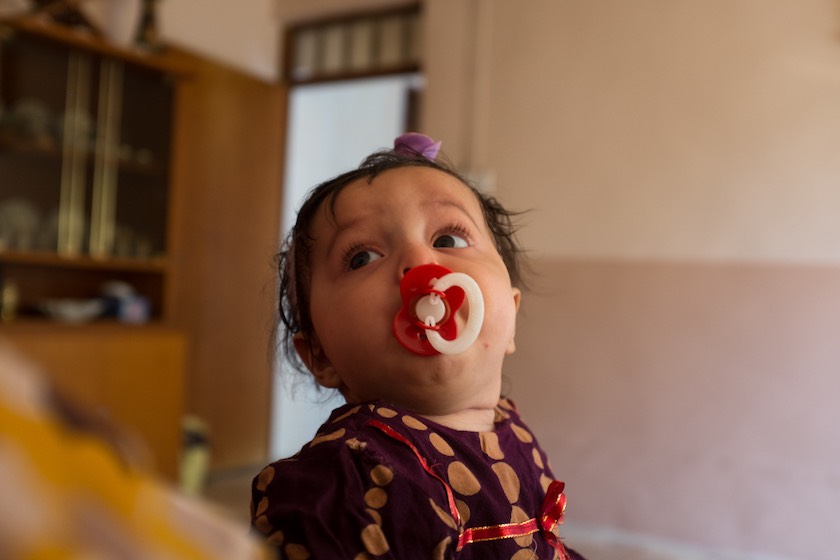When Donald Trump looks at Mosul, a city suffocated by ISIS, he sees missed opportunity. On the campaign trail and in debates, he’s expressed anger and dismay that military forces announced the operation to liberate Mosul months ahead of time. It should have been a sneak attack, he says over and over.
Here’s why Donald Trump is wrong.
Whatever happened to the element of surprise? We announce we’re going after Mosul… These people [ISIS] have all left. They’ve all left.
– Donald J. Trump, Republican presidential nominee
As the head of a humanitarian organization serving on the front lines of the battle for Mosul, I ca›n tell you with certainty: ISIS fighters have not “all left” Mosul.
They are digging in. They’re kidnapping tens of thousands of innocent people from nearby towns and villages and dragging them back to Mosul—and using them as human shields. ISIS militants have set fire to oil wells and sulfur plants, poisoning the air with toxic chemicals whose effects will last for generations. They’re doing all they can to cause as much devastation as possible.
The one thing they’re not doing? Giving up.
But what if they had?
What if Donald Trump was right about Mosul?
What if ISIS had “all left,” as he claims?

Then more than a million people would no longer be subject to the most horrific forms of violence, torture, and oppression.
Yazidi women—whose people were targeted for extermination—would no longer be sex slaves, passed from one ISIS fighter to the next like pieces of property.
Christian families—whose homes were marked by ISIS, who were forced to choose between leaving or being killed—would no longer be exiles.
Public beheadings would no longer be an everyday occurrence in the Mosul city square.

Think of the many lives that would be spared if ISIS had left Mosul already. An ISIS departure would mean less resistance inside Mosul. Less resistance would mean less destruction, less time needed to rebuild. Thousands of displaced people would be able to go home sooner. Markets could reopen faster. Iraq could turn its attention more quickly to the economic and political disenfranchisement that gave rise to ISIS in the first place.
Wouldn’t this be something to celebrate?
Wouldn’t this be cause to rejoice?
Wouldn’t it be good news of the best kind, if ISIS really had left Mosul?
Not if you’re Donald Trump. And not, if we’re honest, to many of us either.
Most of us, deep down, don’t want ISIS to just go away. We want them to pay. We want them to suffer for their misdeeds.
We don’t want peace on earth so much as we want retribution. We want to purge individual ISIS members from the earth, just as they tried to wipe others off the face of God’s good world.
We want them to die.
And we’re not nearly as bothered as we should be that decent, ordinary, innocent people would be killed in the process of meting out “justice.”
Because Mosul? It’s like another world to us. The people there aren’t like us. They’re remote.
Other.
Expendable.
To Donald Trump, they are collateral damage—sad but necessary casualties in an all-or-nothing war.

Make no mistake: there’s only one way a sneak attack would even be possible in a place like Mosul—if you indiscriminately carpet bombed the whole city. Thousands would die. Maybe tens of thousands. All so we can kill a comparatively small number of ISIS militants holed up within.
Up to a million civilian lives so easily sacrificed for maybe five thousand ISIS fighters?
What good is it to say we are “pro-life” if we talk so effortlessly of sneak attacks and carpet bombing?
Yes, it matters that we bring violent extremists to justice. It matters that ISIS members answer for their crimes.
You might say that if we don’t kill them all now, we’ll just have to deal with them later. They’ll just crop up somewhere else and kill again.
But how do we know that? We can’t see into the future with certainty.
Those at the very top of the ISIS pyramid, the ideologues and fanatics who comprise a small percent of the militant group—yes, they will almost certainly pursue death and mayhem to their inevitable end.
But what about the ordinary people who joined ISIS? What about those who joined because there were no jobs, no opportunities, nowhere for them to find a sense of belonging? What about those who joined because they were coerced, their families threatened with death if they refused? Not every one we might call “ISIS” is a cold-blooded killer.
Is there no off-ramp for them, other than a grisly death on a battlefield somewhere? Can we really carpet bomb our way out of this madness? And whatever world is left afterward—will it be worth all the blood we’ve spilled?
How do we know that allowing some to escape—allowing them to live to face justice another day—won’t be the very thing that causes their violent worldview to unravel, the very thing that helps them find the exit? Not just from Mosul, not just from ISIS, but from all forms of extremism.
If they committed crimes, they should answer for them. We can work with Iraqi military, police, and government officials to bring them to justice. Arrest them. And yes, punish them.
But justice—real justice, the kind that rolls on like a river—is not retributive.
This is what Donald Trump doesn’t understand. We don’t tell groups like ISIS “we’re coming for you” because we’re cowards or militarily inept. We say “we’re coming for you” in order to save the lives of one million people who did nothing to deserve being caught up in this fight.
If we can’t parse the difference between seizing an opportunity to save the most lives possible and missing the opportunity to kill the most ISIS members possible, we don’t deserve to call ourselves pro-life. And neither does Donald Trump.


